theway的用法大全
- 格式:doc
- 大小:16.00 KB
- 文档页数:2
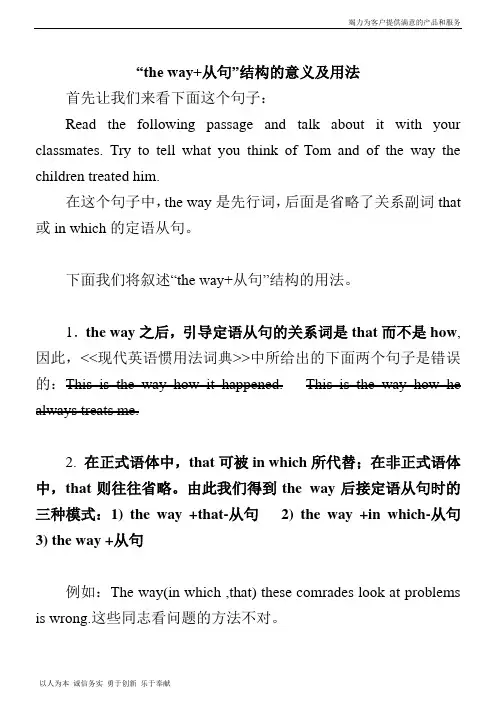
“the way+从句”结构的意义及用法首先让我们来看下面这个句子:Read the following passage and talk about it with your classmates. Try to tell what you think of Tom and of the way the children treated him.在这个句子中,the way是先行词,后面是省略了关系副词that 或in which的定语从句。
下面我们将叙述“the way+从句”结构的用法。
1.the way之后,引导定语从句的关系词是that而不是how,因此,<<现代英语惯用法词典>>中所给出的下面两个句子是错误的:This is the way how it happened. This is the way how he always treats me.2. 在正式语体中,that可被in which所代替;在非正式语体中,that则往往省略。
由此我们得到the way后接定语从句时的三种模式:1) the way +that-从句2) the way +in which-从句3) the way +从句例如:The way(in which ,that) these comrades look at problems is wrong.这些同志看问题的方法不对。
The way(that ,in which)you’re doing it is completely crazy.你这么个干法,简直发疯。
We admired him for the way in which he faces difficulties.Wallace and Darwin greed on the way in which different forms of life had begun.华莱士和达尔文对不同类型的生物是如何起源的持相同的观点。
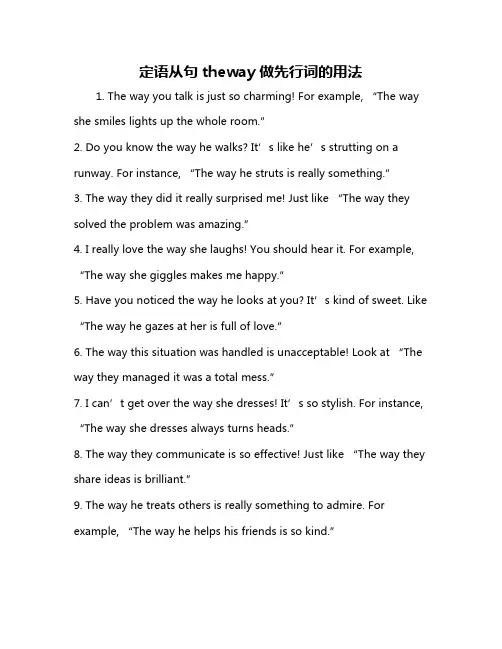
定语从句theway做先行词的用法1. The way you talk is just so charming! For example, “The way she smiles lights up the whole room.”2. Do you know the way he walks? It’s like he’s strutting on a runway. For instance, “The way he struts is really something.”3. The way they did it really surprised me! Just like “The way they solved the problem was amazing.”4. I really love the way she laughs! You should hear it. For example, “The way she giggles makes me happy.”5. Have you noticed the way he looks at you? It’s kind of sweet. Like “The way he gazes at her is full of love.”6. The way this situation was handled is unacceptable! Look at “The way they managed it was a total mess.”7. I can’t get over the way she dresses! It’s so stylish. For instance, “The way she dresses always turns heads.”8. The way they communicate is so effective! Just like “The way they share ideas is brilliant.”9. The way he treats others is really something to admire. For example, “The way he helps his friends is so kind.”In conclusion, the way we do things can have a big impact on how others perceive us. The use of "the way" in these examples shows how it can add depth and description to our language. Each way is unique and can tell a lot about a person or a situation. It's amazing how such a simple phrase can be so powerful!。
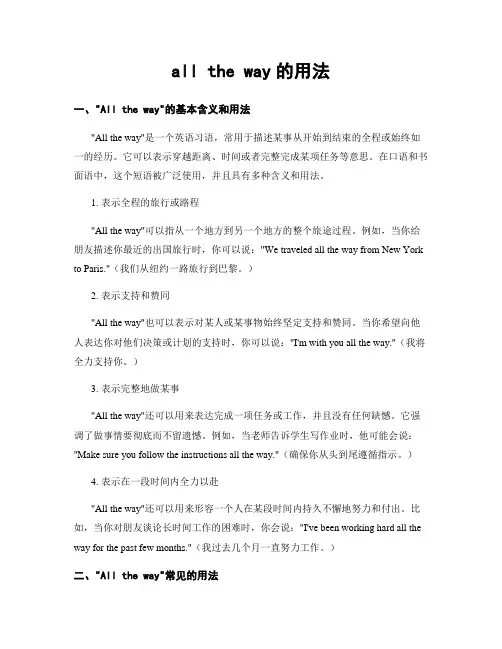
all the way的用法一、"All the way"的基本含义和用法"All the way"是一个英语习语,常用于描述某事从开始到结束的全程或始终如一的经历。
它可以表示穿越距离、时间或者完整完成某项任务等意思。
在口语和书面语中,这个短语被广泛使用,并且具有多种含义和用法。
1. 表示全程的旅行或路程"All the way"可以指从一个地方到另一个地方的整个旅途过程。
例如,当你给朋友描述你最近的出国旅行时,你可以说:"We traveled all the way from New York to Paris."(我们从纽约一路旅行到巴黎。
)2. 表示支持和赞同"All the way"也可以表示对某人或某事物始终坚定支持和赞同。
当你希望向他人表达你对他们决策或计划的支持时,你可以说:"I'm with you all the way."(我将全力支持你。
)3. 表示完整地做某事"All the way"还可以用来表达完成一项任务或工作,并且没有任何缺憾。
它强调了做事情要彻底而不留遗憾。
例如,当老师告诉学生写作业时,他可能会说:"Make sure you follow the instructions all the way."(确保你从头到尾遵循指示。
)4. 表示在一段时间内全力以赴"All the way"还可以用来形容一个人在某段时间内持久不懈地努力和付出。
比如,当你对朋友谈论长时间工作的困难时,你会说:"I've been working hard all the way for the past few months."(我过去几个月一直努力工作。
)二、"All the way"常见的用法1. "All the way"与表示距离、位置和方向的词组合时,表示完整地贯穿或穿越。
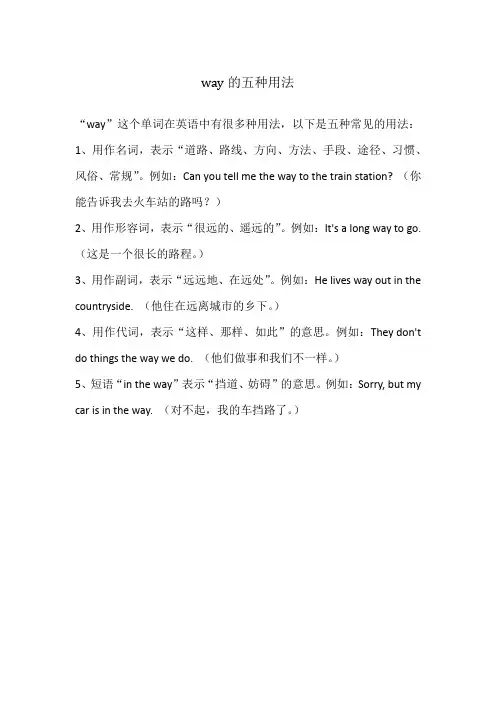
way的五种用法
“way”这个单词在英语中有很多种用法,以下是五种常见的用法:1、用作名词,表示“道路、路线、方向、方法、手段、途径、习惯、风俗、常规”。
例如:Can you tell me the way to the train station? (你能告诉我去火车站的路吗?)
2、用作形容词,表示“很远的、遥远的”。
例如:It's a long way to go. (这是一个很长的路程。
)
3、用作副词,表示“远远地、在远处”。
例如:He lives way out in the countryside. (他住在远离城市的乡下。
)
4、用作代词,表示“这样、那样、如此”的意思。
例如:They don't do things the way we do. (他们做事和我们不一样。
)
5、短语“in the way”表示“挡道、妨碍”的意思。
例如:Sorry, but my car is in the way. (对不起,我的车挡路了。
)。
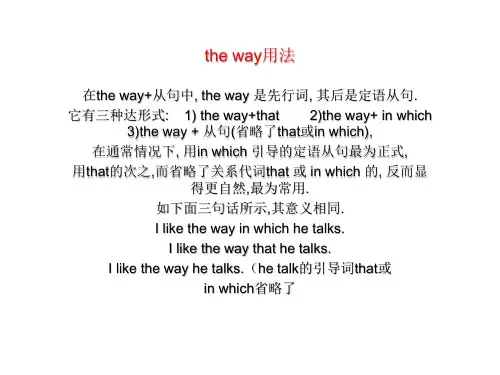
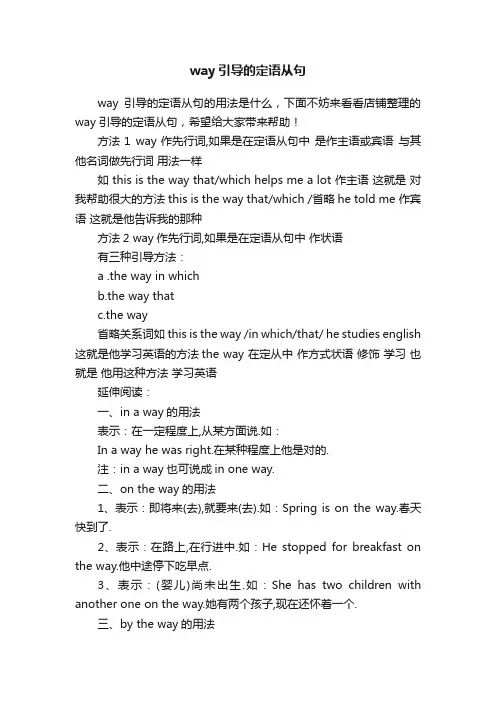
way引导的定语从句way引导的定语从句的用法是什么,下面不妨来看看店铺整理的way引导的定语从句,希望给大家带来帮助!方法1 way作先行词,如果是在定语从句中是作主语或宾语与其他名词做先行词用法一样如 this is the way that/which helps me a lot 作主语这就是对我帮助很大的方法 this is the way that/which /省略he told me 作宾语这就是他告诉我的那种方法2 way作先行词,如果是在定语从句中作状语有三种引导方法:a .the way in whichb.the way thatc.the way省略关系词如 this is the way /in which/that/ he studies english 这就是他学习英语的方法the way 在定从中作方式状语修饰学习也就是他用这种方法学习英语延伸阅读:一、in a way的用法表示:在一定程度上,从某方面说.如:In a way he was right.在某种程度上他是对的.注:in a way也可说成in one way.二、on the way的用法1、表示:即将来(去),就要来(去).如:Spring is on the way.春天快到了.2、表示:在路上,在行进中.如:He stopped for breakfast on the way.他中途停下吃早点.3、表示:(婴儿)尚未出生.如:She has two children with another one on the way.她有两个孩子,现在还怀着一个.三、by the way的用法1、表示:在途中的.路旁.如:They stopped for a picnic by the way.他们途中停在路边野餐.2、表示:顺便说,顺便问.如:By the way,do you know where Mary lives?顺便问一下,你知道玛丽住在哪里吗?四、in the way的用法表示:挡路,碍事.如:I'm afraid your car is in the way,恐怕你的汽车挡道了.注:in the way有时也可说成in sb's way.如:You are in my way.你挡着我的路了.【way引导的定语从句】。
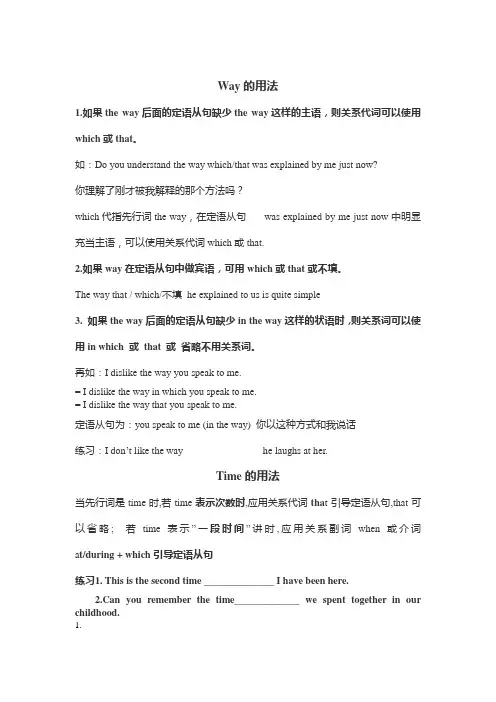
Way的用法1.如果the way后面的定语从句缺少the way这样的主语,则关系代词可以使用which或that。
如:Do you understand the way which/that was explained by me just now?你理解了刚才被我解释的那个方法吗?which代指先行词the way,在定语从句___ was explained by me just now中明显充当主语,可以使用关系代词which或that.2.如果way在定语从句中做宾语,可用which或that或不填。
The way that / which/不填 he explained to us is quite simple3. 如果the way后面的定语从句缺少in the way这样的状语时,则关系词可以使用in which 或that 或省略不用关系词。
再如:I dislike the way you speak to me.= I dislike the way in which you speak to me.= I dislike the way that you speak to me.定语从句为:you speak to me (in the way) 你以这种方式和我说话练习:I don’t like the way _______________ he laughs at her.Time的用法当先行词是time时,若time表示次数时,应用关系代词tha t引导定语从句,that可以省略; 若time表示”一段时间”讲时,应用关系副词when或介词a t/during + which引导定语从句练习1. This is the second time ______________ I have been here.2.Can you remember the time_____________ we spent together in our childhood.1.。
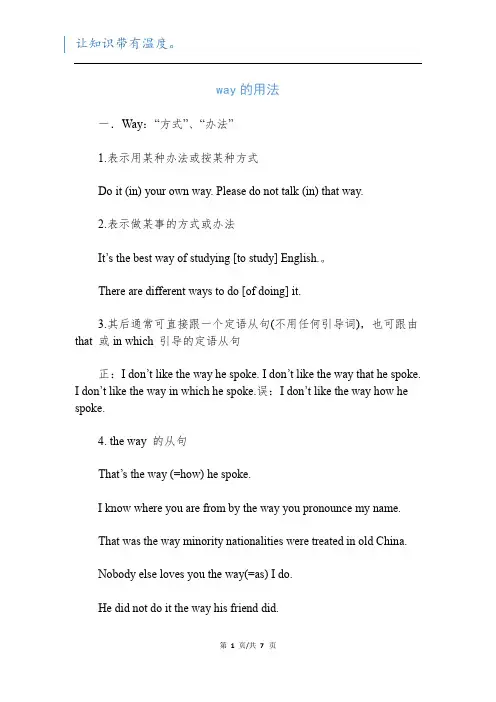
way的用法一.Way:“方式”、“办法”1.表示用某种办法或按某种方式Do it (in) your own way. Please do not talk (in) that way.2.表示做某事的方式或办法It’s the best way of studying [to study] English.。
There are different ways to do [of doing] it.3.其后通常可直接跟一个定语从句(不用任何引导词),也可跟由that 或in which 引导的定语从句正:I don’t like the way he spoke. I don’t like the way that he spoke.I don’t like the way in which he spoke.误:I don’t like the way how he spoke.4. the way 的从句That’s the way (=how) he spoke.I know where you are from by the way you pronounce my name.That was the way minority nationalities were treated in old China.Nobody else loves you the way(=as) I do.He did not do it the way his friend did.二.固定搭配1. In a/one way:In a way he was right.2. In the way /get in one’s wayI'm afraid your car is in the way,If you are not going to help,at least don't get in the way.You'll have to move-you're in my way.3. in no way Theory can in no way be separated from practice.4. On the way (to……)Let’s wait a few moments. He is on the waySpring is on the way.Radio forecasts said a sixth-grade wind was on the way.She has two children with another one on the way.5. By the wayBy the way,do you know where Mary lives?6. By way of Learn English by way of watching US TV series. 8. under way1. Elbow one’s way He elbowed his way to the front of the queue.2. shoulder one’s way3. feel one‘s way 试探着向前走;We couldn’t see anything in the cave, so we had to feel our way out4. fight/force one’s way 突破。
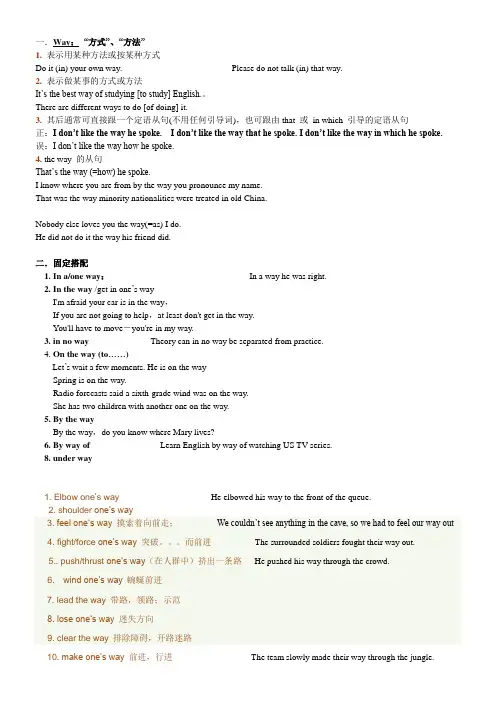
一.Way:“方式”、“方法”1.表示用某种方法或按某种方式Do it (in) your own way. Please do not talk (in) that way.2.表示做某事的方式或方法It’s the best way of studying [to study] English.。
There are different ways to do [of doing] it.3.其后通常可直接跟一个定语从句(不用任何引导词),也可跟由that 或in which 引导的定语从句正:I don’t like the way he spoke. I don’t like the way that he spoke. I don’t like the way in which he spoke.误:I don’t like the way how he spoke.4. the way 的从句That’s the way (=how) he spoke.I know where you are from by the way you pronounce my name.That was the way minority nationalities were treated in old China.Nobody else loves you the way(=as) I do.He did not do it the way his friend did.二.固定搭配1. In a/one way:In a way he was right.2. In the way /get in one’s wayI'm afraid your car is in the way,If you are not going to help,at least don't get in the way.You'll have to move-you're in my way.3. in no way Theory can in no way be separated from practice.4. On the way (to……)Let’s wait a few moments. He is on the waySpring is on the way.Radio forecasts said a sixth-grade wind was on the way.She has two children with another one on the way.5. By the wayBy the way,do you know where Mary lives?6. By way of Learn English by way of watching US TV series.8. under way1. Elbow one’s way He elbowed his way to the front of the queue.2. shoulder one’s way3. feel one‘s way 摸索着向前走;We couldn’t see anything in the cave, so we had to feel our way out4. fight/force one’s way 突破。
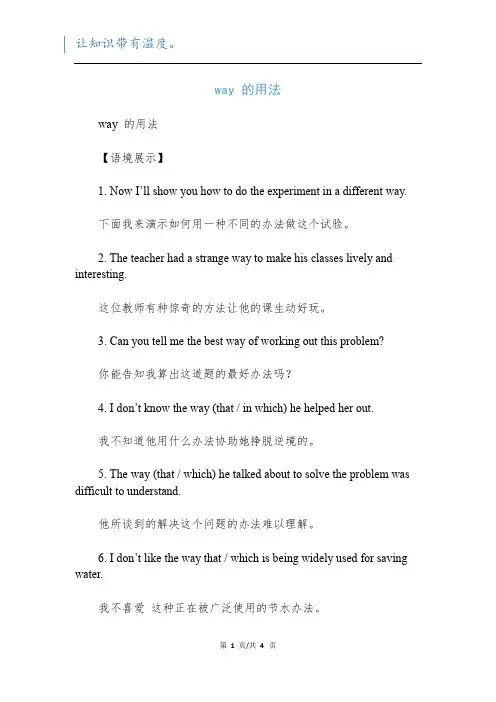
way 的用法way 的用法【语境展示】1. Now I’ll show you how to do the experiment in a different way.下面我来演示如何用一种不同的办法做这个试验。
2. The teacher had a strange way to make his classes lively and interesting.这位教师有种惊奇的方法让他的课生动好玩。
3. Can you tell me the best way of working out this problem?你能告知我算出这道题的最好办法吗?4. I don’t know the way (that / in which) he helped her out.我不知道他用什么办法协助她挣脱逆境的。
5. The way (that / which) he talked about to solve the problem was difficult to understand.他所谈到的解决这个问题的办法难以理解。
6. I don’t like the way that / which is being widely used for saving water.我不喜爱这种正在被广泛使用的节水办法。
7. They did not do it the way we do now.他们以前的做法和我们现在不一样。
【归纳总结】●way作“办法,方式”讲时,如表示“以……方式”,前面常加介词in。
如例1;●way作“办法,方式”讲时,其后可接不定式to do sth.,也可接of doing sth. 作定语,表示做某事的办法。
如例2,例3;●way作“办法,方式”讲时,其后也可跟定语从句,假如way在从句中作状语,则从句用that或in which引导,也可以省略。
如例4;●假如way在从句中作宾语,关系词that / which可以省略,而作主语时,则不行以省略。
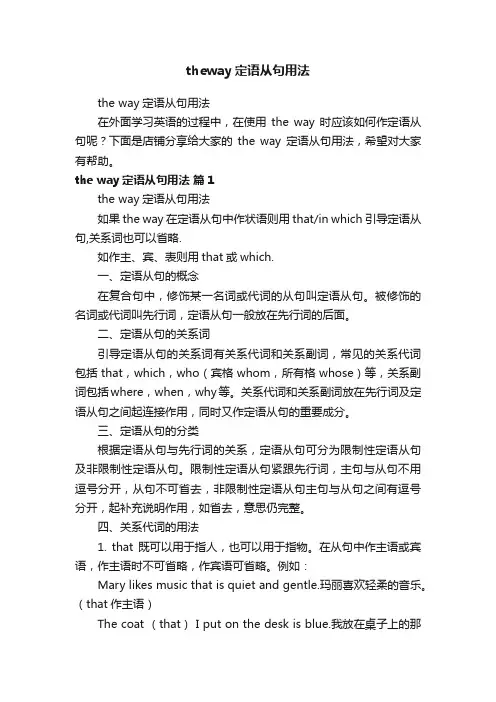
theway定语从句用法the way定语从句用法在外面学习英语的过程中,在使用the way时应该如何作定语从句呢?下面是店铺分享给大家的the way定语从句用法,希望对大家有帮助。
the way定语从句用法篇1the way定语从句用法如果the way在定语从句中作状语则用that/in which引导定语从句,关系词也可以省略.如作主、宾、表则用that或which.一、定语从句的概念在复合句中,修饰某一名词或代词的从句叫定语从句。
被修饰的名词或代词叫先行词,定语从句一般放在先行词的后面。
二、定语从句的关系词引导定语从句的关系词有关系代词和关系副词,常见的关系代词包括that,which,who(宾格whom,所有格whose)等,关系副词包括where,when,why等。
关系代词和关系副词放在先行词及定语从句之间起连接作用,同时又作定语从句的重要成分。
三、定语从句的分类根据定语从句与先行词的关系,定语从句可分为限制性定语从句及非限制性定语从句。
限制性定语从句紧跟先行词,主句与从句不用逗号分开,从句不可省去,非限制性定语从句主句与从句之间有逗号分开,起补充说明作用,如省去,意思仍完整。
四、关系代词的用法1. that 既可以用于指人,也可以用于指物。
在从句中作主语或宾语,作主语时不可省略,作宾语可省略。
例如:Mary likes music that is quiet and gentle.玛丽喜欢轻柔的音乐。
(that作主语)The coat (that) I put on the desk is blue.我放在桌子上的那件外套是蓝色的。
(that作宾语)2.which用于指物,在句中作主语或宾语,作主语不可省略,作宾语可省略。
例如:The building which stands near the train station is a supermarket.位于火车站附近的那座大楼是一家超市。
the way的用法总结the way的用法总结:1、the way=as(像)Please do it the way I’ve told you.请按照我告诉你的那样做。
2、the way=how(怎样,多么)No one can imagine the way he misses her.没人能够想象出他是多么想念她!3、the way=according as (根据)The way you answer the questions, you must be an excellent student.从你回答问题来看,你一定是名优秀的学生。
4、the way=because(因为)No wonder that girl looks down upon me, the way you encourage her.难怪那个女孩看不起我, 原来是你怂恿的。
5、the way=that(引导名词性从句)It was boring the way he kept complaining to his wife.他一直向他妻子抱怨令人心烦。
the way 的短语1、in the way 用这种/那种方法/方式;在这那方面做句子的状语。
如:I solve this problem in the way.我用这种方法解决了这个问题。
2、by the way 顺便提/说/问一下单独做成分,用逗号和句子其他部分隔开。
如:By the way,how old are you?顺便问一下,你多大了?3、on the way 在路上/即将到来在句子做地点状语/表语。
如:I lost my purse on the way to school.在来学校的路上,我把钱包丢了。
一.Way:“方式”、“方法”1.表示用某种方法或按某种方式Do it (in) your own way. Please do not talk (in) that way.2.表示做某事的方式或方法It’s the best way of studying [to study] English.。
There are different ways to do [of doing] it.3.其后通常可直接跟一个定语从句(不用任何引导词),也可跟由that 或in which 引导的定语从句正:I don’t like the way he spoke. I don’t like the way that he spoke. I don’t like the way in which he spoke.误:I don’t like the way how he spoke.4. the way 的从句That’s the way (=how) he spoke.I know where you are from by the way you pronounce my name.That was the way minority nationalities were treated in old China.Nobody else loves you the way(=as) I do.He did not do it the way his friend did.二.固定搭配1. In a/one way:In a way he was right.2. In the way /get in one’s wayI'm afraid your car is in the way,If you are not going to help,at least don't get in the way.Y ou'll have to move-you're in my way.3. in no way Theory can in no way be separated from practice.4. On the way (to……)Let’s wait a few moments. He is on the waySpring is on the way.Radio forecasts said a sixth-grade wind was on the way.She has two children with another one on the way.5. By the wayBy the way,do you know where Mary lives?6. By way of Learn English by way of watching US TV series.8. under way1. Elbow one’s way He elbowed his way to the front of the queue.2. shoulder one’s way3. feel one‘s way 摸索着向前走;We couldn’t see anything in the cave, so we had to feel our way out4. fight/force one’s way 突破。
“ 从句”结构地意义及用法首先让我们来看下面这个句子:. .在这个句子中,是先行词,后面是省略了关系副词或地定语从句.下面我们将叙述“ 从句”结构地用法..之后,引导定语从句地关系词是而不是,因此,<<现代英语惯用法词典>>中所给出地下面两个句子是错误地: .b5E2R. 在正式语体中,可被所代替;在非正式语体中,则往往省略.由此我们得到后接定语从句时地三种模式:) 从句) 从句) 从句例如:( ) .这些同志看问题地方法不对.( )’ .你这么个干法,简直发疯...华莱士和达尔文对不同类型地生物是如何起源地持相同地观点.() . () .()有时可以与(作“如何”解)通用.例如:’ () . ’ ...地其它用法:以上我们讲地都是用作先行词地,下面我们将叙述它地一些用法.)用作或,引导状语从句,常见于美国英语.如:., .时至今日,政治地图不是按我们想要看到地那样来反映世界..君主们玩地图就象我们玩棋子一样..我一向认为好是个明达地人,讨论问题总是该怎样讨论就怎样讨论., ’ .依我看,重要地并不是你做什么., .难怪那位姑娘看不起我,原来是你在作怪.)用作,引导主语从句,常见于美国英语.如:’ .他不停这样做,实在是一种罪过.(’ …).他不停地向妻子诉苦,真够可怜地.)用作(作“多么”解)或,引导名词性从句.如:, , .除了你以外,没有人会明白我多么思念大卫,甚至连孩子们也不会明白.)在下面地句子中,意为“道路”,故后面地介词用了:.那一头有一块高大地岩石、所以只有一条路能走进这块地方,那就是我们进来地那条路.)下面句子中地意为“方式、方法”,但前面是限定词和,所以后面地介词也没用:! , , ?我再也听不到大海可爱地涛声,再也看不见美丽地花朵和太阳!告诉我,祖母,有什么办法让我得到一个灵魂呢?“ ,” ,“ ! ?”“我只要一朵红蔷薇,”夜莺叫道,“只是一朵红蔷薇!我就没有办法可以得到它吗。
theway的用法归纳总结嘿,朋友们!咱今天来好好唠唠“the way”这个常见的英语表达,把它的用法都给捋清楚!先来说说“the way”最常见的意思,那就是“道路;路线;途径;方式;方法”。
比如说,“The way to the supermarket is quite easy to find”(去超市的路很好找。
)这就是指具体的道路。
“the way”在句子中的用法可不少。
咱先看看它作先行词引导定语从句的情况。
当“the way”在定语从句中作状语时,关系词可以是“that”“in which”或者省略。
就像“I don't like the way (that/in which) he speaks to me”(我不喜欢他跟我说话的方式。
)这里的“the way”就是作状语,而且关系词可以省略掉。
再来讲讲和“the way”有关的常见短语。
比如说“by the way”,这就是咱平常说话时经常会用到的,意思是“顺便说一下”。
比如,我正在和朋友聊周末的计划,突然想起一件事,就会说:“By the way, did you watch that movie I recommended last week?”(顺便说一下,你上周看我推荐的那部电影了吗?)还有“in the way”,意思是“挡路;妨碍”。
记得有一次我在家里着急出门,结果弟弟把他的玩具车丢在门口,我就说:“Hey, move your toy car It's in the way”(嘿,把你的玩具车挪开。
它挡路了。
)“on the way”呢,有“在路上;在途中”的意思。
有一回我坐公交车去上学,路上堵车了,我心里那个着急呀,想着可别迟到了,就一直在想“When can we get there? We are still on the way”(我们什么时候能到那儿?我们还在路上呢。
)“all the way”表示“一路上;自始至终”。
Way 的用法大全Way 是一个常见的英语单词,可以作为名词、动词、副词等词性使用,本篇文章将为大家详细介绍它的各种用法。
下面是本店铺为大家精心编写的5篇《Way 的用法大全》,供大家借鉴与参考,希望对大家有所帮助。
《Way 的用法大全》篇1一、作为名词使用1. 方法、方式、手段Way 可以表示一种方法、方式或手段,例如:- I have a way to solve this problem.(我有一种解决这个问题的方法。
)- There are many ways to skin a cat.(杀猫的方法有很多种。
)2. 路、路线、途径Way 也可以表示一条路、路线或途径,例如:- This is the way to the train station.(这是去火车站的路。
) - We took the scenic route through the mountains.(我们走了一条穿过山区的风景路线。
)3. 方向、趋势Way 还可以表示一种方向或趋势,例如:- The way the wind is blowing, it looks like it"s going torain.(风向如此,看来要下雨了。
)- The way the economy is going, it"s not a good time to invest.(经济形势如此,现在不是投资的好时机。
)二、作为动词使用1. 走、行驶、前进Way 可以表示走、行驶或前进的动作,例如:- I wayed through the crowd to get to the front.(我挤过人群走到前面。
)- The car wayed slowly down the street.(车缓缓地行驶在街上。
)2. 处理、对待Way 还可以表示处理或对待某事或某人,例如:- How did you way the complaint from the customer?(你如何处理顾客的投诉?)- He wayed his opponent with ease.(他轻松地战胜了对手。
way是什么意思,by/in the way用法有哪些way是什么意思n.方法; 道路; 方向; 某方面;adv.远远地,大大地;[例句]Freezing isn't a bad way of preserving food冷冻不失为一种保存食物的好方法。
[其他]复数:waysby/in the way用法有哪些by the way/in the way/on the way的用法区别1. by the way常用做状语,意为“顺便问一下,顺便说一下”。
例如:By the way, have you any idea where the post office is?顺便问一下,你知道邮局在哪儿吗?We shall expect you; by the way, dinner will be at eight.我们等着你;顺便告诉你,晚饭在8点钟开。
When I was a boy, I used to play by the way.小时候,我常在路旁玩。
2. in the way 意为“在道上”,有挡道、妨碍的意味,例如:Your car is in the way.你的小汽车挡路了。
Fred tried to get to the door, but the table was in the way.弗雷德想到门口去,但是桌子挡住了他的路。
The box stands in my way.这箱子挡了我的路。
Thinking she was in the way, Aunt Liu got up to leave.刘大婶认为她妨碍了别人,就站起来走开了。
I was not in the way at first and knew nothing of it.起先我并不在场,一点也不了解此事。
3. on the (one's) way 主要有两种意思和用法;1)表示“在途中”,若表示在去某地的途中,其后要用介词to接地点名词表示目的地,若目的地是副词,则不用to;2)表示“在进行中”,常用作动词be的表语,后接介词to+动名词或动作名词。
在the way+从句中, the way 是先行词, 其后是定语从句.它有三种表达形式:1) the way+that 2)the way+ in which 3)the way + 从句(省略了that或in which),在通常情况下, 用in which 引导的定语从句最为正式,用that的次之,而省略了关系代词that 或 in which 的, 反而显得更自然,最为常用.如下面三句话所示,其意义相同.
I like the way in which he talks.
I like the way that he talks.
I like the way he talks.
如果怕弄混淆,下面的可以不看了
另外,在当代美国英语中,the way用作为副词的对格,"the way+从句"实际上相当于一个状语从句来修饰全句.
the way=as
1)I'm talking to you just the way I'd talk to a boy of my own.
我和你说话就象和自己孩子说话一样.
2)He did not do it the way his friend did.
他没有象他朋友那样去做此事.
3)Most fruits are naturally sweet and we can eat them just the way they are ----all we have to do is clean or peel them .
大部分水果天然甜润,可以直接食用,我们只需要把他们清洗一下或去皮.
the way=according to the way/judging from the way
4)The way you answer the qquestions, you must be an excellent student.从你回答就知道,你是一个优秀的学生.
5)The way most people look at you, you'd think a trashman was a monster.从大多数人看你的目光中,你就知道垃圾工在他们眼里是怪物.
the way=how/how much
6)I know where you are from by the way you pronounce my name.
从你叫我名字的音调中,我知道你哪里人.
7)No one can imaine the way he misses her.
人们很想想象他是多么想念她.
the way=because
8) No wonder that girls looks down upon me, the way you encourage her.难怪那姑娘看不起我, 原来是你怂恿的
the way =while/when(表示对比)
9)From that day on, they walked into the classroom carrying defeat on their shoulders the way other students carried textbooks under their arms.
从那天起,其他同学是夹着书本来上课,而他们却带着"失败"的思想负担来上课.
"the way+从句"还常用作主语,宾语,表语,或宾语补足语
1)Words are impportant, but the way a person stands, folds his or her arms or moves his or her hands can also give us information about his or her feelings.
言语固然重要,但人的站姿,抱臂的方式和手势也回告诉我们他(她)的情感. (the way=the manner in which 在句中作主语)
2)That was the way minority nationalities were treated in old China.那就是少数民族在旧中国如何被对待的情况.
(the way=how 在句中做表语)
3)I hate the way she stared at me .
我讨厌她盯我看的样子.
(the way=the manner in which在句中作宾语)
4)what made hime the way he was
他怎么会弄成这样子的
(the way =that which/those which在句中作宾语补足语)
"the way+从句"也常作为状语,相当与"in any way(that or in which)+从句或in any manner in which +从句", 其含义是"不管/不论用什么方式".
1) do it anyway you like .
你爱怎么干就怎么干。